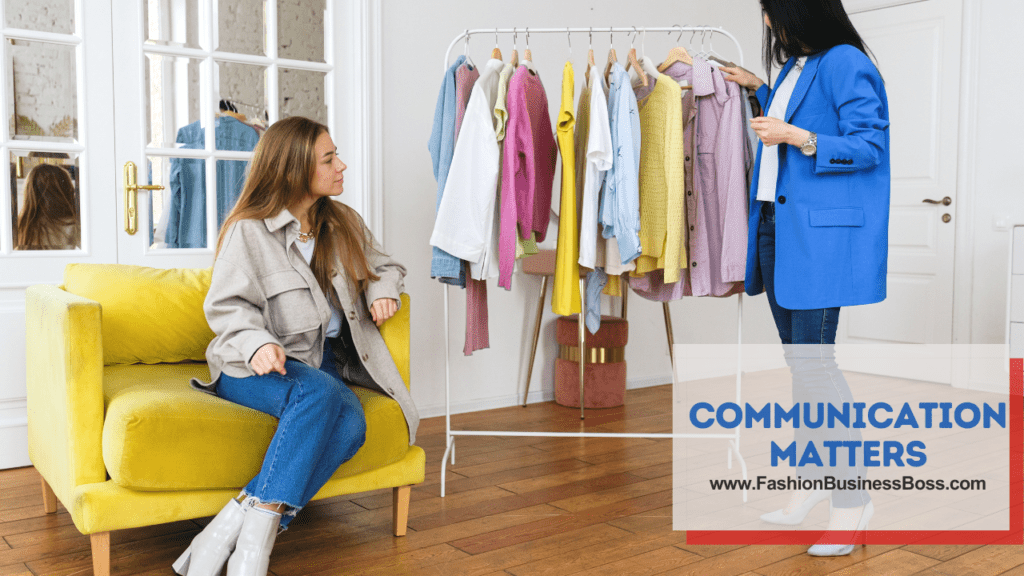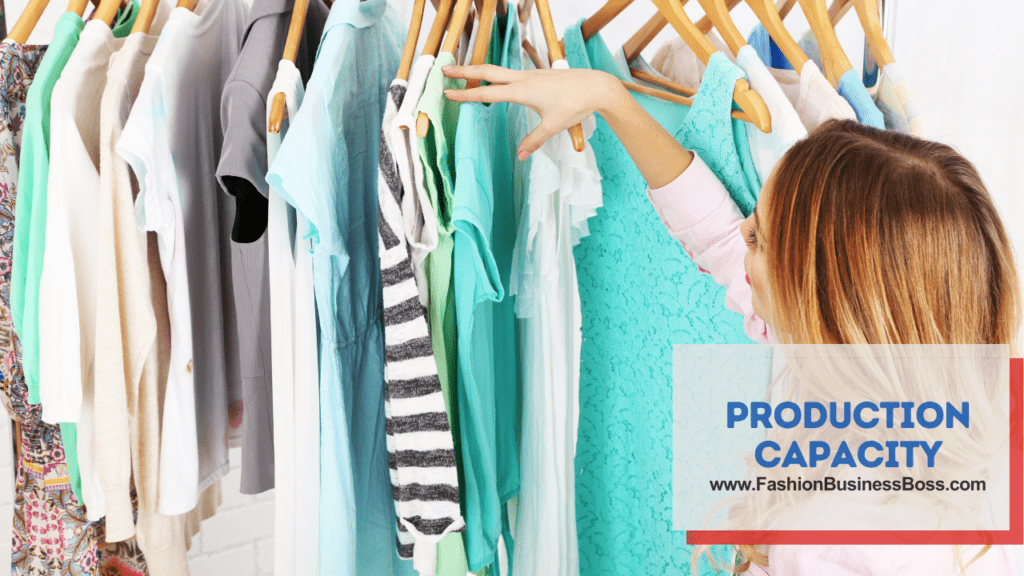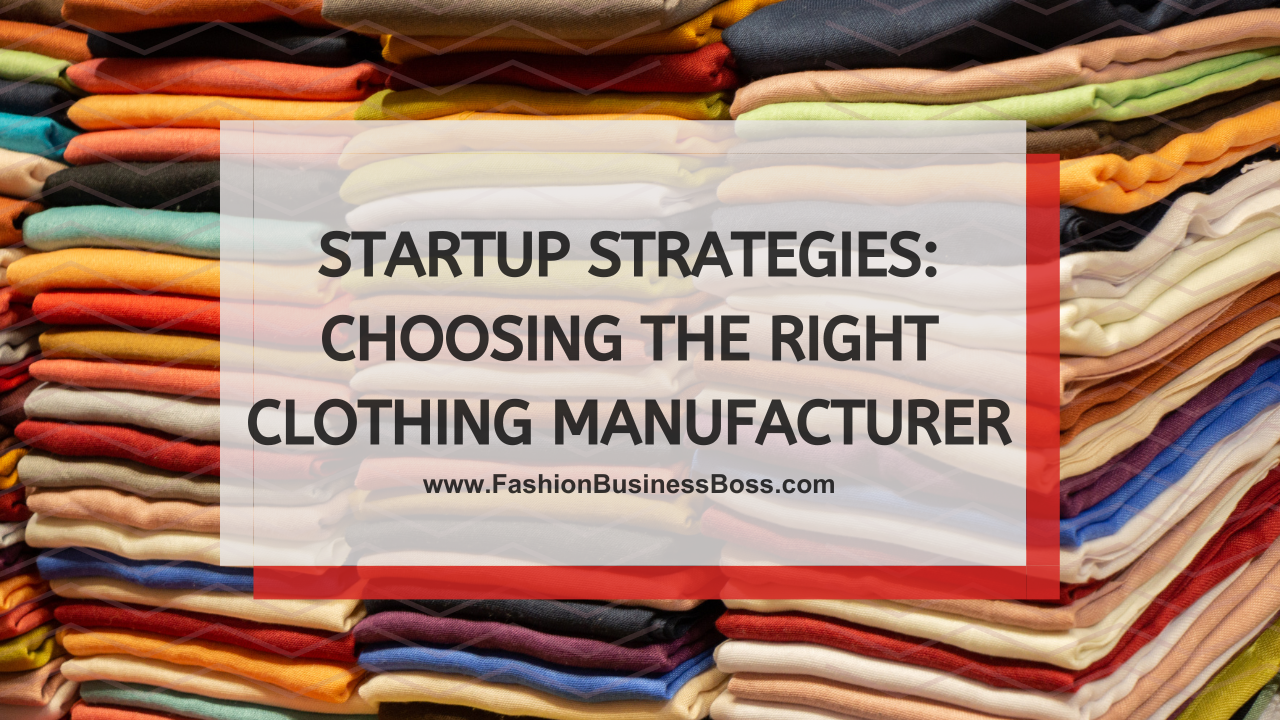In the ever-evolving fashion industry, startup clothing brands face a myriad of challenges. One of the most critical decisions they must make is choosing the right clothing manufacturer. This choice can significantly impact the quality, cost, and growth of your venture.
To turn your startup fashion dream into reality, finding the perfect clothing manufacturer is crucial. Quality, ethics, and communication are key factors to consider. Make the right choice and watch your brand flourish.
In this article, we will guide you through the process of selecting the perfect clothing manufacturer for your startup.
1. Define Your Brand and Vision

Begin by pausing before you explore your options among clothing manufacturers. Instead, start by clearly understanding your brand and vision. This involves thinking about the type of clothing you want to create and who you want to wear it.
Firstly, consider the style of clothing you aim to produce. Are you going for casual wear, formal attire, or something entirely unique? Understand the aesthetic and design elements that make up your clothing line.
Secondly, identify your target audience. Who are the people you want to wear your clothing? What are their preferences, age group, and interests? Knowing your target audience will help you tailor your clothing choices to their tastes.
By taking the time to define your brand and vision in simple terms, you’ll be better equipped to find a clothing manufacturer that aligns perfectly with your ideas and goals. This clarity ensures that your manufacturer understands your vision, resulting in a smoother and more collaborations.
Read more about: Instagram’s Fashion Frontier: How to Start a Clothing Brand on Instagram
2. Research Thoroughly
Begin your journey by conducting thorough research on potential clothing manufacturers. The internet offers a vast treasure trove of information that you can access conveniently. Your objective is to identify a manufacturer that suits your needs.
One crucial aspect of your research is to look for manufacturers with prior experience in producing clothing that aligns with your intended product line. This experience is vital because it indicates their familiarity with the nuances of your chosen clothing style.
Moreover, delve into customer reviews and testimonials to gain insights into the experiences of others who have worked with these manufacturers. Examining their websites and scrutinizing their portfolios will provide you with a visual representation of their work quality.
Location matters, too. Consider the geographical location of the manufacturer, as it can affect shipping costs and times. Assess their production capacity to ensure they can handle your production volume adequately.
Lastly, pricing is a crucial factor. Analyze the pricing structures of potential manufacturers to determine whether they align with your budgetary constraints.
By conducting comprehensive research, you empower yourself with the knowledge necessary to make an informed decision, increasing the likelihood of a favorable partnership with a suitable clothing manufacturer for your startup.
3. Quality Over Price
It’s quite common for startups to have limited budgets. However, it’s crucial to prioritize the quality of your clothing over seeking the lowest price tag. Opting for cheap manufacturing might appear to be a money-saving approach at first glance, but it can have detrimental effects on your brand’s reputation.
The quality of your clothing serves as a direct reflection of your brand’s image. Subpar quality can lead to customer dissatisfaction, returns, and negative reviews, which could ultimately harm your brand’s credibility.
Instead, it’s advisable to seek manufacturers that strike a balance between quality and cost. While you should be mindful of your budget, compromising on quality can prove to be more costly in the long run.
Bear in mind that investing in better quality clothing manufacturing not only preserves your brand’s reputation but can also lead to higher customer satisfaction and loyalty. So, when choosing a manufacturer, always prioritize quality to safeguard your brand’s image and long-term growth.
4. Communication Matters

Effective communication serves as the cornerstone of a productive partnership with your chosen manufacturer. It plays a pivotal role in ensuring that your shared goals are met efficiently and accurately.
To begin, initiate contact with potential manufacturers and pay close attention to their responsiveness and willingness to collaborate. This initial interaction provides valuable insights into how well you can work together in the future.
Clear and open communication is essential because it enables you to convey your vision and expectations to the manufacturer accurately. When your manufacturer understands your requirements, they are better equipped to execute your clothing designs correctly, avoiding misunderstandings and costly errors.
Fostering a collaborative environment where both parties feel comfortable sharing ideas and feedback can lead to innovative solutions and improvements in the manufacturing process.
Read more about: Mastering the Art of Fashion Entrepreneurship: Selling Your Clothing Brand
5. Visit the Facility
Whenever it is feasible, making a physical visit to the manufacturing facility holds significant benefits. This hands-on approach allows you to gain invaluable insights into the entire production process.
By being present at the facility, you can witness firsthand how your clothing items are manufactured. This provides you with a deeper understanding of the production workflow, quality control measures, and the overall work environment. Assessing working conditions ensures that they align with your ethical standards and that your manufacturer adheres to responsible practices.
Moreover, a personal visit offers an opportunity to forge a stronger and more meaningful relationship with your manufacturer. Face-to-face interactions can help build trust and mutual understanding, fostering a more collaborative partnership.
However, if visiting the facility in person is not an option due to logistical constraints, you can request videos or virtual tours. These alternatives can provide you with a visual representation of the manufacturing process and the working conditions, allowing you to make informed decisions from a distance.
6. Samples and Prototypes
Before committing to a substantial production order, it’s prudent to request samples or prototypes of the clothing items you intend to manufacture. This precautionary step serves a crucial purpose: it allows you to assess the quality of the products and make any required adjustments to ensure they align with your vision.
By obtaining samples or prototypes, you gain the opportunity to inspect the actual materials, workmanship, and overall design of your clothing items. This close examination ensures that the final products meet your quality standards and expectations.
Moreover, if there are any issues or discrepancies, addressing them at this stage is considerably more cost-effective and efficient than attempting corrections after mass production has commenced. It minimizes the potential for production delays and reduces the likelihood of costly rework.
Requesting samples and prototypes is a prudent and proactive step in the manufacturing process. It empowers you to fine-tune your clothing items, ensuring they meet your desired quality and specifications before embarking on larger-scale production.
7. Production Capacity

It’s crucial to take into account the production capacity of your chosen manufacturer. This capacity refers to their ability to produce the quantity of clothing items you require. Thinking ahead and evaluating this aspect is essential, especially as your startup expands.
Consider whether your chosen manufacturer can meet the growing demand for your clothing items as your business scales up. This foresight is vital to prevent potential production bottlenecks in the future.
If the manufacturer’s production capacity falls short of your future needs, it can result in delays, missed opportunities, and increased costs. Therefore, it’s advisable to discuss your long-term plans with the manufacturer and ensure that they have the capability to accommodate your projected growth.
Assessing the production capacity of your clothing manufacturer is a prudent step to avoid potential hurdles as your startup evolves. Ensuring scalability from the outset can help you maintain a seamless production process and meet the demands of a growing customer base.
Read more about: Insider Information on How to Start Your Own Clothing Brand
8. Ethical Considerations
In today’s world, where social consciousness is on the rise, ethical considerations play a vital role in business decisions. When selecting a manufacturer for your clothing line, it’s crucial to investigate and assess their ethical practices.
First and foremost, examine the labor conditions maintained by the manufacturer. Ensure that they uphold fair labor practices, treat their workers ethically, and provide safe and healthy working environments. Ethical labor practices not only align with societal values but also reflect positively on your brand.
Evaluate the environmental impact of the manufacturer’s operations. Sustainable and eco-friendly manufacturing processes are increasingly valued by consumers. Partnering with an environmentally responsible manufacturer can contribute to a positive brand image and help reduce your ecological footprint.
Being associated with an ethical manufacturer can enhance your brand’s reputation, garner the trust of socially conscious consumers, and demonstrate your commitment to responsible business practices.
9. Legal and Contractual Aspects
When entering into a partnership with a clothing manufacturer for your startup, it is imperative to give due consideration to legal and contractual aspects. The foundation of this collaboration rests on a well-crafted and comprehensive contract. This legally binding agreement serves as a roadmap, outlining the expectations, quality standards, pricing terms, delivery schedules, and penalties for non-compliance.
By clearly defining your expectations, you ensure that both parties are aligned regarding project requirements. Setting quality standards acts as a benchmark to maintain the desired level of quality in the manufactured clothing items. Transparent pricing terms prevent misunderstandings, and specifying delivery schedules helps you plan your inventory and meet customer demands effectively.
Moreover, outlining penalties for non-compliance serves as a deterrent against potential breaches of the agreement. Establishing a robust contract not only protects your interests but also contributes to a smoother working relationship with the manufacturer, reducing the likelihood of disputes and facilitating a secure and mutually beneficial collaboration.
10. Build a Strong Relationship

The culmination of your collaboration with a clothing manufacturer doesn’t mark the end of your interaction; rather, it signals the beginning of a partnership that can thrive with nurturing. Building a robust and mutually beneficial relationship is key to ensuring the continued growth of your venture.
One fundamental aspect of this relationship is maintaining open and clear communication. Regular and transparent dialogue with your manufacturer allows for the effective exchange of ideas, feedback, and updates. This ensures that both parties remain informed and aligned, minimizing misunderstandings and enhancing collaboration.
Respecting agreed-upon deadlines is another essential element. Punctuality demonstrates professionalism and reliability, instilling confidence in your manufacturer. Adhering to schedules also helps in meeting production and delivery targets.
Furthermore, showing appreciation for the manufacturer’s work fosters goodwill and a positive working environment. Acknowledging their efforts and expressing gratitude can go a long way in building trust and goodwill.
Read more about: Mastering E-Commerce: Creating Your Clothing Website
Conclusion
Choosing the right clothing manufacturer for your startup is a pivotal decision. It can determine the growth or failure of your brand. By defining your vision, conducting thorough research, prioritizing quality, and fostering effective communication, you can navigate the complexities of clothing manufacturing and set your startup on a path to improvement.
Frequently Asked Questions

Q: What should startups consider when choosing a clothing manufacturer?
A: Startups should consider factors such as the manufacturer’s experience, production capacity, ethical practices, pricing, and communication capabilities when selecting a clothing manufacturer.
Q: How can I ensure the quality of clothing produced by a manufacturer?
A: Ensuring quality involves requesting samples or prototypes, conducting factory visits if possible, and establishing clear quality standards in the manufacturing contract.
Q: Are there any ethical considerations when choosing a clothing manufacturer?
A: Yes, ethical considerations include evaluating the manufacturer’s labor practices, working conditions, and environmental impact to ensure alignment with your brand’s values.
Q: What legal aspects should be addressed when working with a clothing manufacturer?
A: Legal aspects involve drafting a comprehensive contract that outlines expectations, pricing, delivery schedules, penalties for non-compliance, and other essential terms to protect both parties.
Q: How can I build a strong partnership with my clothing manufacturer?
A: Building a strong partnership involves maintaining open communication, respecting deadlines, showing appreciation for their work, and fostering a collaborative and mutually beneficial relationship.
To learn more about starting your own clothing business, check out my startup documents here.
The information provided by FashionBusinessBoss.com (“The Site”) is for general informational purposes only. All information on the Site is provided in good faith, however, we make no representation or warranty of any kind, express or implied, regarding the accuracy, adequacy, validity, reliability, availability or completeness of any information on the Site. Under no circumstance shall we have any liability to you for any loss or damage of any kind incurred as a result of the use of the Site or Reliance on any information provided on the Site. Your use of the Site and your reliance on any information on the Site is solely at your own risk. This blog post is for educational purposes only and does not constitute legal advice. Please consult a legal expert to address your specific needs. Terms and Conditions. (https://fashionbusinessboss.com/terms-and-conditions/)

Meet Shawn Chun: Entrepreneur and Fashion Business Fan.
I’m a happy individual who happens to be an entrepreneur. I have owned several types of businesses in my life from a coffee shop to an import and export business to an online review business plus a few more and now I create online resources for those interested in starting new ventures. It’s demanding work but I love it. I do it for those passionate about their business and their goals. That’s why when I meet a designer or boutique owner at a craft fair, farmers market, retail location or anywhere else I see myself. I know how hard the struggle is to retain clients, find good employees and keep the business growing all while trying to stay competitive.
That’s why I created Fashion Business Boss: I want to help fashion business owners like you build a thriving business that brings you endless joy and supports your ideal lifestyle.

